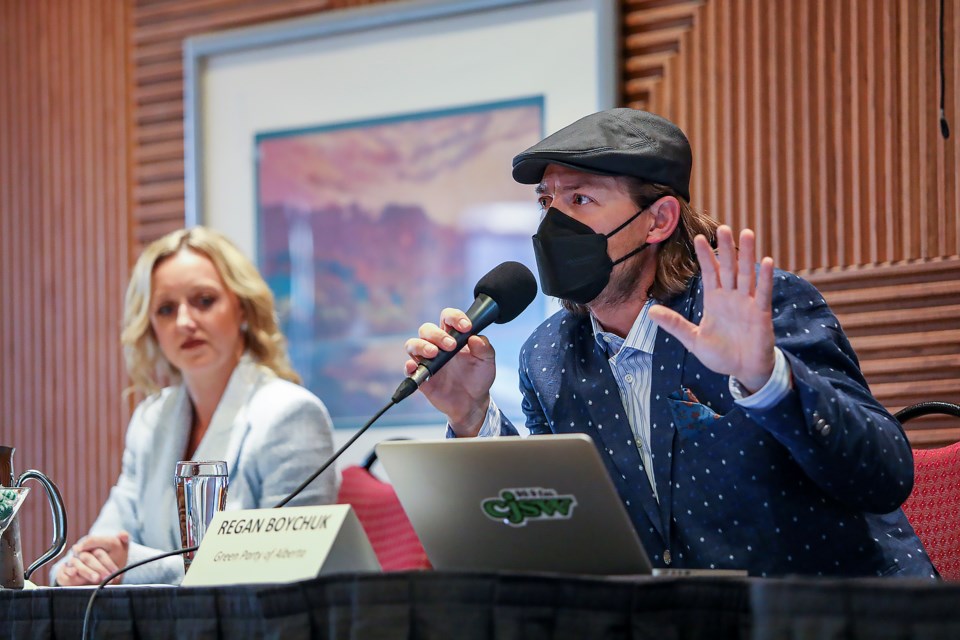BANFF – Lack of affordable housing and escalating cost of living expenses as part of the affordability crisis in the Bow Valley are central issues in the election race in the swing riding of Banff-Kananaskis.
With less than a week until the May 29 election and advanced voting running May 23-27, the UCP’s Miranda Rosin, NDP’s Sarah Elmeligi, Solidarity Movement candidate Kyle Jubb and the Green Party’s Regan Boychuk all squared off on a host of issues at an all-candidates forum in Banff last week.
Candidates spoke to the type of cost relief their respective parties could bring to the greater Bow Valley community given inflation and spiralling costs are eroding quality of life and pushing many people out of Canmore and Banff.
“The most important thing that we can do locally is support affordable housing in our valley, and it’s challenging because we don’t always have the land,” said incumbent Rosin during a forum at the Banff Park Lodge hosted by Banff and Lake Louise Hospitality Association on May 16.
“We’ve done so much work over the past four years to get us to a point where we were able to transfer land to the Town of Canmore for affordable housing to give a foundation that we can build on and give development dollars to in the future.”
Rosin was referring to the province’s 11th hour announcement in April to hand over a 2.3-hectare parcel of land off Palliser Trail valued at $8.7 million for affordable housing in Canmore. The land will be held while planning and design get underway.
Rosin’s comments drew swift remarks from Elmeligi, who indicated the UCP has had four years to get on top of the Bow Valley’s housing crisis rather than leaving it shortly before the election writ was dropped to hand over land to the Town of Canmore, which had been lobbying for this and another parcel for years.
“What’s really important when we talk about affordability for the Bow Valley is the timing of these actions. We can’t wait four years to transfer lands, we need to actually start building and getting shovels in the ground much sooner,” she said.
“The NDP is committed to addressing affordable housing and affordability from day one – and as somebody who lives here, I know what it’s like to watch my friends leave the valley, I know what it’s like to struggle to pay our monthly bills and I want to address that sooner rather than later.”
Rosin said the Palliser lands will be handed over to the Town of Canmore as soon as there is an approved project.
“We’re not waiting three or four years to transfer this land to the Town of Canmore. In fact, if the Town of Canmore wants to put forward a development plan for the housing tomorrow, then we will transfer the land tomorrow,” she said.
“It’s typically municipalities that make their own plans and we’ll come forward with capital funding when the time is right – the land is ready to transfer as soon as we have a development plan in place."
As part of the election campaign, the NDP has committed to building 8,500 affordable housing units province-wide and increasing rental assistance to support 11,000 more households.
“A big portion of those housing units will come here,” said Elmeligi.
Additional housing in the Bow Valley will also help support tourism operators trying to keep frontline staff, said Elmeligi.
“It’s very difficult for businesses to recruit and retain staff if those staff don’t have somewhere to live,” she said.
“Affordable housing is a huge priority for us, not only to attract nurses and teachers who also don’t have anywhere to live when they move here, but also to attract and retain some of our hospitality or tourism-related staff.”
The Green Party’s Boychuk said concerns over cost of living and housing affordability are the top issues he’s hearing while door-knocking on the campaign trail.
He said the Greens are interested in introducing a residential vacancy tax and rent controls and caps.
“Folks at the top of the income ladder are connected to those at the bottom and we take from the top to try to make it a little bit more affordable at the bottom,” said Boychuk.
Rosin said a re-elected United Conservative government will create a new eight per cent tax bracket on income under $60,000 and extend the fuel tax removal until Dec. 31, 2023, saving drivers 13 cents per litre at the pump.
“We believe the No. 1 thing we can do to help Albertans through the affordability crisis is to allow them to keep more of their hard-earned money in their own pockets,” she said.
The NDP announced plans to eliminate the small business tax for more than 100,000 small businesses, like retail stores, restaurants, mechanic shops and more.
“The majority of our businesses here in the Bow Valley are small so this is going to help the mom-and-pop shops – the bike shop who tunes your bike up every year, or where you get coffee,” she said.
“This small business tax elimination hopefully will create some space for businesses to hire more staff or whatever their priorities are.”
To help with increasing expenses, Elmeligi also spoke to the NDP’s plan to establish a tax-refundable credit of up to $500 per child each year that can be applied to the cost of any recreational or extracurricular programming.
“Soccer, sure. Swimming, sure.Violin, whatever. Arts, yeah, you got it. This is extra-curricular for something your child wants to explore and learn,” she said.
“You don’t have to apply, you just submit it with taxes at the end of the year and get that money back.”




